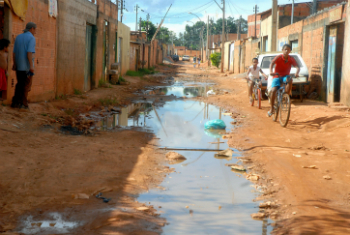Not unlike sociology, political science or anthropology, economics is also a social science, since its object of study is also the result of social life. More specifically, its focus is on understanding how relationships between individuals and organizations in society from the point of view of production, exchange and consumption of goods, services and goods in general. Thus, Economics will deal with the study of the allocation of available resources by men co-participants of a life in society, analyzing how the latter manages these same scarce resources.
Unemployment, inflation, public deficit, changes in interest rates, financial contributions from the States in times of crisis, tax increases, devaluation of the exchange rate, among many other expressions, are already part of our daily life and are of interest to the economy as a science. The major social problems (social exclusion in some countries, the issue of the environment, technological backwardness, rates of unemployment, the financial crisis) of our time are linked to economic problems and, therefore, are also studied by Is it over there.
Professors Carlos Roberto Martins Passos and Otto Nogami, in the book “The Principles of Economics” (2005), teach that this science is divided into two more general areas, which means that there are macroeconomic studies and microeconomic. According to them (PASSOS & NOGAMI, 2001, p. 70), "Microeconomic theory, or microeconomics, is concerned with explaining the economic behavior of individual decision-making units represented by consumers, firms [companies] and owners of productive resources [production factors, form inputs general]. She studies the interaction between firms and consumers and the way in which production and price are determined in specific markets.” on the more detailed study of the action and the economic relationship between the so-called economic agents: companies, consumers or family units and the State. Companies would be responsible for offering products and services and would aim for maximum profit. The demand for products and services would come from consumers or family units, aiming at the best standard for meeting their wishes, that is, the demand itself. On the other hand, the State, responsible for the organization and regularization of society – therefore also of the economy, in certain aspects – could act at the same time as a businessman and a consumer. From this interaction between such agents, there is the market, which is the place or context in which buyers (which make up the side demand) and sellers (who make up the supply side) of goods, services or resources establish contacts and carry out transactions. Thus, it is necessary to consider that the economic system offers limits for such agents to be carried out, that is, to reach their goals. These limits consist of the scarcity of supply compared to demand. So scarcity means that society has limited resources and therefore cannot produce all the goods and services that people want. In this sense, given this scarcity, the decisions taken by each individual within the economic interaction will determine the price of a given product. Therefore, knowledge of Microeconomics is essential to understand and predict agents' behavior, decisions and strategies. It is up to microeconomics to study how economic agents within the market (interacting with it) under a given price system, given the limitations (scarcity) of resources for production, take decisions.
Do not stop now... There's more after the advertising ;)
Macroeconomic theory, or macroeconomics, according to these professors (ibidem, p, 70), “studies the behavior of the economy as a whole”. Thus, its object of study is what determines and what modifies the behavior of aggregated variables, such as the total production of goods and services, economic growth rate, inflation and unemployment rates, job creation, total consumption expenditure, total investment expenditures, total savings volume, total government expenditures, levels of GDP (Gross Domestic Product), etc. Thus, issues related to the international economy, from the point of view of commercial and financial relations and transactions between countries and economic blocs also fall within the scope of macroeconomics, as many of the events and situations internal to the economies national events are a reflection of external events, a fact that proves the level of economic globalization reached today.
However, at the end of this brief explanation of the pillars that make up Economics as a science, it is worth making the point that, despite this division between micro and macroeconomy, these limits and border zones between these areas become increasingly difficult to be defined with precision. This is what Robert S. Pindyck and Daniel L. Rubinfeld in the book, translated into Portuguese, “Microeconomics” (2010), when they state that this difficulty in defining the specifics is because “macroeconomics also involves market analysis (the which to some extent would only be the object of microeconomics) – for example, aggregate markets for goods and services, labor and corporate bonds. To understand how such aggregate markets operate, it is necessary to understand the behavior of companies, consumers, workers and investors that comprise them. In this way, macroeconomists have been increasingly concerned with the microeconomic foundations of economic phenomena aggregates, and much of macroeconomics is actually an extension of microeconomic analysis” (PINDYCK & RUBINFELD, 2010, P. 04).
Thus, it is the economist's role to apply and elaborate models or hypotheses to analyze and clarify situations, in addition, of course, to draft forecasts (not always decisions) on the direction of the market and the economy, national or international, considering the tools and instruments provided by both the micro and the macroeconomics.
References:
STEPS, C. A. M.; NOGAMI, O. Principles of economics. 3rd ed. São Paulo: Pioneer, 2001. 475p
PINDYCK, R. S.; RUBINFELD, D.L. Microeconomics. 7th ed. São Paulo: Pearson Education of Brazil, 2010.
Paulo Silvino Ribeiro
Brazil School Collaborator
Bachelor in Social Sciences from UNICAMP - State University of Campinas
Master in Sociology from UNESP - São Paulo State University "Júlio de Mesquita Filho"
Doctoral Student in Sociology at UNICAMP - State University of Campinas

